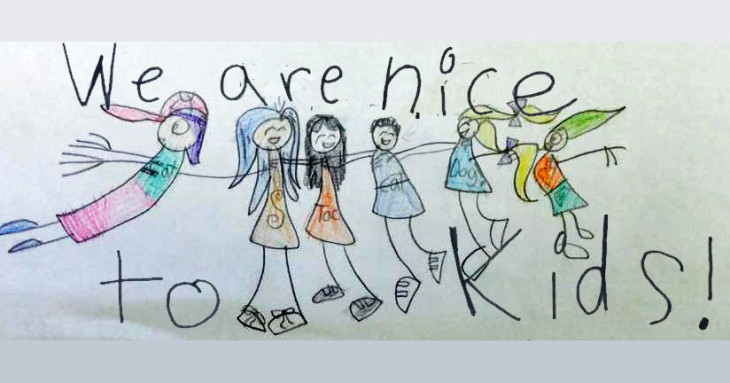By Michelle Strater Gunderson.
Last week a group of my first grade girls was taking an unusually long time in the bathroom. When you teach little ones you get a sixth sense for when something is going on. I knocked on the door and said, “Dear ones, whatever can be keeping you?” The ring leader answered me with her cute front toothless diction, “We are talking about Trump because we know you won’t let us in the classroom. We can’t stand him.”
Now, before you jump straight to the comments section and make ungodly statements about my ban on political speech and intolerance of differences, you need to hear me out.
I teach in a Chicago Public School in a neighborhood that is traditionally LGBTQ. Many of our students have two moms or two dads, and it is fair to say that most of our families are politically liberal with many who consider themselves progressive. Yet, in this context, there are families who still support Trump.
During the month before the election, one of my students made it very clear that his family supported Donald Trump, and he talked about it often. The children started teasing him on the playground. In fact, the taunting game became “nanny nanny boo boo, you vote for Trump” as children tag one another (much like the game of cooties you might remember from childhood).
After recess that day girl came running into the classroom crying uncontrollably. “Why would they say I like Trump? I am a good person. I don’t say bad things.”
We held a class meeting to try to work this out, but the crying kept up, and the hurt feelings were incredibly deep. Now, I ask you, reader, how have these conversations been going for you about Donald Trump with the adults in your lives? How many relatives or friends have you lost on Facebook? Put yourself in the children’s shoes. Can you imagine how confusing and how hard it is to navigate this space for first graders?
Usually during class meetings we make a group decision about how we are going to proceed in working with one another, but there just seemed to be no end to it. I finally said, “These are arguments that adults are having, and it is very hard right now for us to understand one another.” I decided that we would not talk about the election in our classroom any more. I needed to protect the children whose families supported Trump and stop the harmful teasing before it went any further.
This is my thirtieth year of teaching, and I have always taught about the elections and current events no matter what grade I teach. But this was more than we could approach in our class. Many of our families consider Trump’s presidency as an existential threat and the anxiety and pressure has filtered down to the children. And when children feel anxiety and pressure, they misbehave.
The other day, an eruption happened during lunch in the cafeteria. One of my students decided to go around the room calling the others “losers.” You are probably saying to yourself that first graders have been calling each other losers for decades. And you would be right. It is one of the reasons that the rhetoric of Donald Trump is so difficult for me to accept as an educator.
But this instance was different than the name calling of days gone by. It was harsh, and it targeted vulnerable kids. Children call each other names to get a reaction, and they know when language is heightened and charged. Think about times you have experienced children using potty language. A child knows when something is wrong, and they experiment with the power of it.
The name calling was a problem that I took care of one on one. There was an opportunity for the name caller to apologize to the children harmed, and a gentle and careful talk from me. The child who called others losers did not to be excoriated publicly. He is just mimicking what he has seen and heard from adults.
All of this brings me back to a question I have asked my friends: How do we teach in the time of Trump? In my mind, we do what we have always done, but with a renewed sense of urgency. We help our children use kind words. We teach them that there are many things that go on in the outside world, but our classrooms will always be safe spaces. And we hope that they do not act like our president. A situation that makes me incredibly sad.
Michelle Strater Gunderson is a 30 year teaching veteran who teaches first grade in the Chicago Public Schools.






Leave a Reply